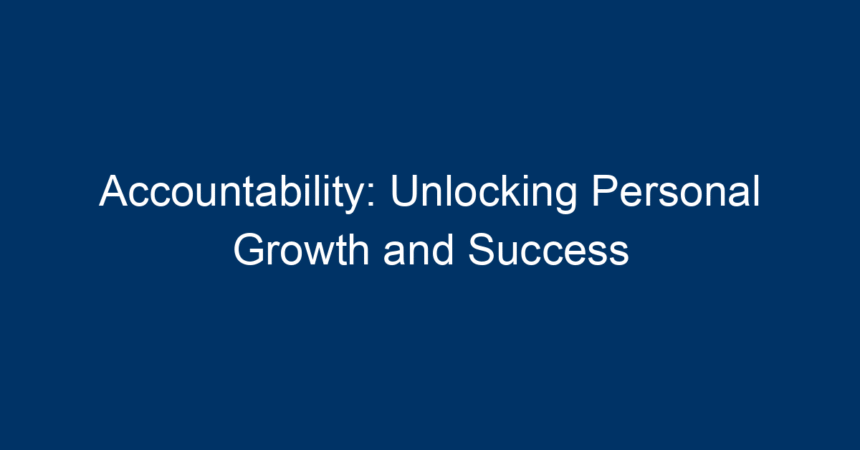In a rapidly changing world, where distractions are everywhere and personal goals are often sidelined, accountability emerges as a powerful tool for personal growth and success. It’s more than just a buzzword; it’s a critical component that can transform your undertaking into tangible results. This article delves deep into the concept of accountability, exploring how it can catalyze personal development and ultimately lead to success.
What is Accountability?
At its core, accountability means taking responsibility for one’s actions and decisions. It involves being answerable to oneself and others, ensuring that you follow through with commitments and goals. This concept not only applies in professional environments but also plays a crucial role in personal lives.
The Importance of Accountability
-
Promotes Responsibility: When you hold yourself accountable, you recognize that your decisions come with consequences. This recognition helps in fostering a responsible mindset.
-
Encourages Self-Reflection: Regularly assessing your actions and their outcomes enables deeper self-reflection, which can highlight areas for improvement and growth.
-
Strengthens Relationships: Accountability fosters trust. When you consistently meet your commitments, others are more likely to do the same, enhancing teamwork and collaboration.
- Enhances Goal Achievement: Setting goals is important, but being accountable for them is what ensures you stay on track and fulfill your ambitions.
The Accountability Framework
To effectively employ accountability in your life, consider adopting an Accountability Framework. This structured approach can guide you through setting, tracking, and achieving your personal or professional goals.
1. Set Clear Goals
The first step in ensuring accountability is setting clear, measurable, and defined goals. S.M.A.R.T. goals — Specific, Measurable, Achievable, Relevant, and Time-bound — provide a solid foundation for ensuring clarity in your objectives.
Example: Instead of saying "I want to get fit," articulate it as "I will run three times a week for 30 minutes for the next three months."
2. Find an Accountability Partner
An accountability partner is someone who supports your goals and holds you responsible for your progress. This could be a friend, colleague, or a mentor who understands your objectives and is willing to check in on your progress regularly.
3. Regular Check-Ins
Schedule weekly or bi-weekly check-ins with your accountability partner to discuss your progress. These conversations should focus not only on successes but also on challenges faced along the way. The practice of discussing your journey can provide motivation and insights into your development.
4. Track Your Progress
Keeping a detailed log of your progress can serve several purposes. It helps in visualizing how far you’ve come, identifies patterns in your behavior, and shows areas that need more focus.
5. Reflect and Adjust
Being accountable isn’t just about checking boxes; it involves regular reflection on what’s working and what isn’t. After each period of goal-tracking, take the time to analyze your approach. Are your strategies effective? What challenges have emerged? Adjust your approach as necessary for continued growth.
The Role of Accountability in Personal Growth
Boosts Motivation
When you’re accountable, you’re more likely to stay motivated. Knowing someone else is counting on you can ignite a sense of urgency and commitment, which is vital for personal growth.
Builds Discipline
Accountability cultivates discipline, essential for long-term success. When you commit to your goals and hold yourself accountable for actions, you develop consistency in your routines, establishing productive habits over time.
Increases Resilience
The road to success is often riddled with challenges. Accountability helps you bounce back from setbacks rather than dwell on failure. Embracing your responsibility allows you to take constructive actions and maintain a forward momentum, reinforcing resilience.
Techniques to Foster a Culture of Accountability
Implement Accountability Systems
In a professional environment, creating an accountability system can enhance productivity. This can be through:
-
Daily Stand-Ups: Quick morning meetings to align on the day’s goals can keep the team focused.
- Performance Reviews: Regular check-ins for performance evaluations facilitate constructive feedback.
Encourage Open Communication
Fostering a culture of open communication allows team members to express challenges without fear. When accountability is ingrained in the organizational culture, individuals feel valued and understood, thereby increasing their commitment to their responsibilities.
Celebrate Successes
Acknowledging achievements, regardless of size, reinforces the value of accountability. Celebrating milestones fosters a sense of accomplishment, further motivating individuals to pursue their goals.
Overcoming Accountability Barriers
While accountability is vital for growth, it comes with its own set of challenges. Here are some common barriers and ways to overcome them:
Fear of Judgment
The fear of being judged can hinder individuals from being accountable. To combat this, create a safe environment for sharing setbacks without fear of criticism. This creates a supportive culture where individuals feel comfortable owning their failures and learning from them.
Lack of Clarity
Ambiguous goals can impede accountability. Ensure all goals are crystal clear to establish a shared understanding of responsibilities among all involved.
Procrastination
The tendency to procrastinate can undermine accountability efforts. Break down tasks into smaller, manageable steps and focus on immediate actions to combat procrastination effectively.
Conclusion: Actionable Insights
Accountability is not merely a personal tool; it’s an essential skill that leads to growth and success. To harness its power:
- Clearly define your goals and ensure they are S.M.A.R.T.
- Engage an accountability partner to bolster commitment.
- Schedule regular check-ins for progress tracking.
- Reflect and adjust your strategies based on insights and circumstances.
- Celebrate small wins to foster motivation and a sense of achievement.
By embedding accountability into your daily routine, you can unlock the personal growth and success you desire. Remember, accountability is a journey—take that first step today!




